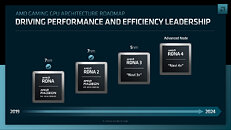- Joined
- Oct 9, 2007
- Messages
- 47,878 (7.38/day)
- Location
- Dublin, Ireland
| System Name | RBMK-1000 |
|---|---|
| Processor | AMD Ryzen 7 5700G |
| Motherboard | Gigabyte B550 AORUS Elite V2 |
| Cooling | DeepCool Gammax L240 V2 |
| Memory | 2x 16GB DDR4-3200 |
| Video Card(s) | Galax RTX 4070 Ti EX |
| Storage | Samsung 990 1TB |
| Display(s) | BenQ 1440p 60 Hz 27-inch |
| Case | Corsair Carbide 100R |
| Audio Device(s) | ASUS SupremeFX S1220A |
| Power Supply | Cooler Master MWE Gold 650W |
| Mouse | ASUS ROG Strix Impact |
| Keyboard | Gamdias Hermes E2 |
| Software | Windows 11 Pro |
We've known since way back in August 2023, that AMD is rumored to be retreating from the enthusiast graphics segment with its next-generation RDNA 4 graphics architecture, which means that we likely won't see successors to the RX 7900 series squaring off against the upper end of NVIDIA's fastest GeForce RTX "Blackwell" series. What we'll get instead is a product stack closely resembling that of the RX 5000 series RDNA, with its top part providing a highly competitive price-performance mix around the $400-mark. A more recent report by Moore's Law is Dead sheds more light on this part.
Apparently, the top Radeon RX SKU based on the next-gen RDNA4 graphics architecture will offer performance comparable to that of the current RX 7900 XTX, but at less than half its price (around the $400 mark). It is also expected to achieve this performance target using a smaller, simpler silicon, with significantly lower board cost, leading up to its price. What's more, there could be energy efficiency gains made from the switch to a newer 4 nm-class foundry node and the RDNA4 architecture itself; which could achieve its performance target using fewer numbers of compute units than the RX 7900 XTX with its 96.

When it came out, the RX 5700 XT offered an interesting performance proposition, beating the RTX 2070, and forcing NVIDIA to refresh its product stack with the RTX 20-series SUPER, and the resulting RTX 2070 SUPER. Things could go down slightly differently with RDNA4. Back in 2019, ray tracing was a novelty, and AMD could surprise NVIDIA in the performance segment even without it. There is no such advantage now, ray tracing is relevant; and so AMD could count on timing its launch before the Q4-2024 debut of the RTX 50-series "Blackwell."
View at TechPowerUp Main Site | Source
Apparently, the top Radeon RX SKU based on the next-gen RDNA4 graphics architecture will offer performance comparable to that of the current RX 7900 XTX, but at less than half its price (around the $400 mark). It is also expected to achieve this performance target using a smaller, simpler silicon, with significantly lower board cost, leading up to its price. What's more, there could be energy efficiency gains made from the switch to a newer 4 nm-class foundry node and the RDNA4 architecture itself; which could achieve its performance target using fewer numbers of compute units than the RX 7900 XTX with its 96.

When it came out, the RX 5700 XT offered an interesting performance proposition, beating the RTX 2070, and forcing NVIDIA to refresh its product stack with the RTX 20-series SUPER, and the resulting RTX 2070 SUPER. Things could go down slightly differently with RDNA4. Back in 2019, ray tracing was a novelty, and AMD could surprise NVIDIA in the performance segment even without it. There is no such advantage now, ray tracing is relevant; and so AMD could count on timing its launch before the Q4-2024 debut of the RTX 50-series "Blackwell."
View at TechPowerUp Main Site | Source











